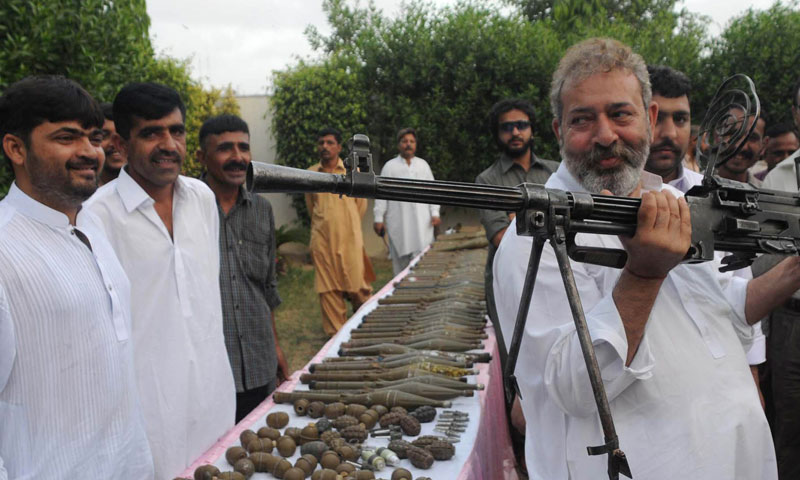KARACHI: His brutal end may dent police morale to some extent. It could have also been a loss for his colleagues they never thought of. But the violent end met by SP Mohammad Aslam Khan was never unexpected.
“Sooner or later it had to happen — it was inevitable. He chose this way to die,” says one of his close aides in an almost inaudible voice while sobbing consistently.
SP Mohammad Aslam Khan, better known as Chaudhry Aslam, is a household name for those who are aware of the city police one way or another. With 30 years of service in Karachi police, SP Khan was a symbol of success for many and of hatred for others.
For many he was a source of protection and for some a consistent harassment. He lived with controversies but these hardly mattered to stop him from his theory of policing -- fight fire with fire.
Since the 1990s ‘Karachi operation’ to the killing of Abdul Rahman Baloch alias Rahman Dakait in an alleged encounter in 2009, and from April 2012 days of Lyari siege to shootout with suspected militants in Manghopir area hours before the fatal attack on his life, SP Khan was recognised for many reasons by police authorities, the media and political parties.
Described by Sindh IG Shahid Nadim Baloch as one of the most ‘threatened officers’ working in the city for his recent ‘success’ in the arrest of members of a ‘banned outfit’, SP Khan was looking after the anti-extremism cell of the Crime Investigation Department (CID) of Sindh police.
Although the Tehreek-i-Taliban Pakistan has claimed responsibility for the attack, many in the business of crime would have never wanted him to be alive. He had a history of paying the price for his ambitious, sometimes suspicious, professional career that began in 1984 when he joined the police force as an assistant sub-inspector.
For the Muttahida Qaumi Movement and those aware of the city’s bloody political history, he is better known as the Gulbahar station house officer in the mid-1990s. Those were the days when – some senior reporters remember – they had occasionally seen him wearing police uniform.
SP Khan was one of the several officers serving police in the 1990s when political activists — almost all associated with the then Muhajir Qaumi Movement — were killed in police encounters that were later documented as ‘extra-judicial killings’ and still described by the party as ‘state terrorism’.
The brutal trend, with then interior minister Naseerullah Babar as its official in charge, led to end of the second Benazir Bhutto government in 1996. Extrajudicial killings in Karachi and corruption scandals were cited as major reasons by then president Farooq Khan Leghari for dissolving the assemblies.
Most of the officers associated with the ‘Karachi operation’ have been assassinated one by one over the past decade. But SP Khan was promoted as deputy superintendent of police in 1998 and his work earned him the rank of superintendent of police in 2005. But controversies dogged his professional growth.
In 2006, the SP was put behind bars for staging an encounter, as head of the Lyari task force, to kill notorious dacoit Mashooq Brohi. Aslam Khan and his colleagues spent 16 months in jail before being released in Dec 2007 on bail granted by the Sindh High Court.
The 2006 memories of the Brohi case were not over when he came under the spotlight again in 2009 for no different reason. As an SP for Investigation East-II, Mr Khan’s team killed the alleged Lyari gangster, Rahman Dakait, and his three associates in an alleged encounter.
After hitting headlines for surviving an attack in Sept 2011 on his Defence Society residence, he was in the limelight again in April 2012 after police laid siege to Lyari in order to trap criminals.
Police called off the ‘Lyari operation’ after a week without any success for SP Khan and his team. Twelve policemen lost their lives.
The 47-year-old officer, as documented in the official record, SP Khan seemed as calm as on any other day after every shootout with militants and gangsters and even attack on his life. Called as ‘Karachi version of Dirty Harry’ and ‘Pakistan’s toughest cop’ by foreign media, SP Khan survived several attacks on his life before falling at last on Thursday. But the number of such attempts always remained a mystery.
“Maybe it’s five,” shared one of his colleagues before taking a pause and said again: “But wait. It’s nine, I think. But you see it hardly matters. I think he only shared or remembered those which left him with loss to some extent one way or the other. Like he survived but his guards were killed or he remained unhurt. It’s his daily business and he had been facing it since 1995.”
SP Khan never remained out of focus. For media, police hierarchy and the political circles he was always in. In Dec 1998 he arrested MQM activist Saulat Mirza, describing him as a prize catch from Karachi airport minutes after he returned from Bangkok.
Mirza is now facing death sentence for killing Karachi Electric Supply Company (KESC) Malik Shahid Hamid in 1997 and admitted killing a number of people, including a Pakistani employee of the United States Drug Enforcement Agency in 1995.
Interestingly, a few years later SP Khan and the only son of the slain chief of the power utility Omer Shahid Hamid became colleagues and close aides to serve together at Lyari Task Force and the CID.











































